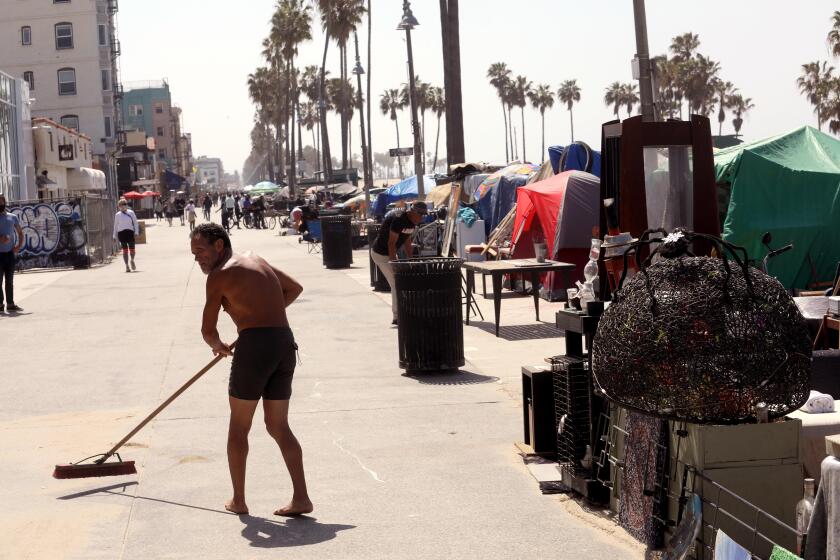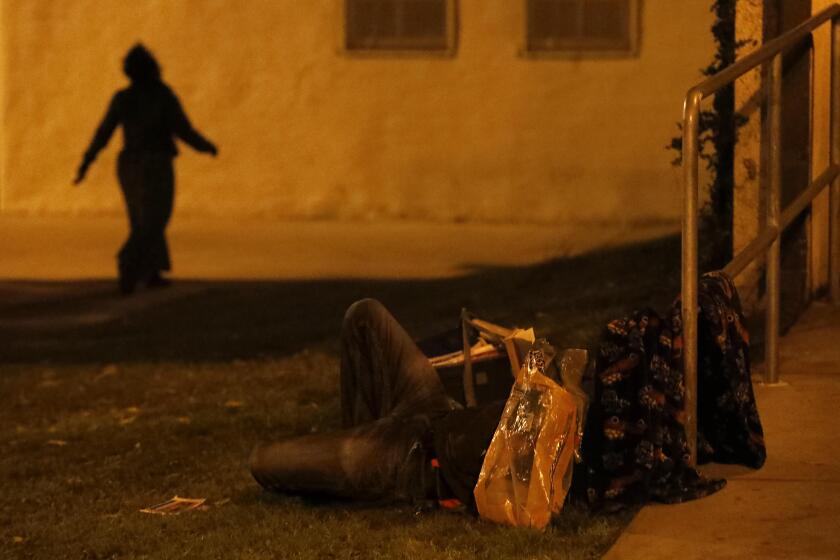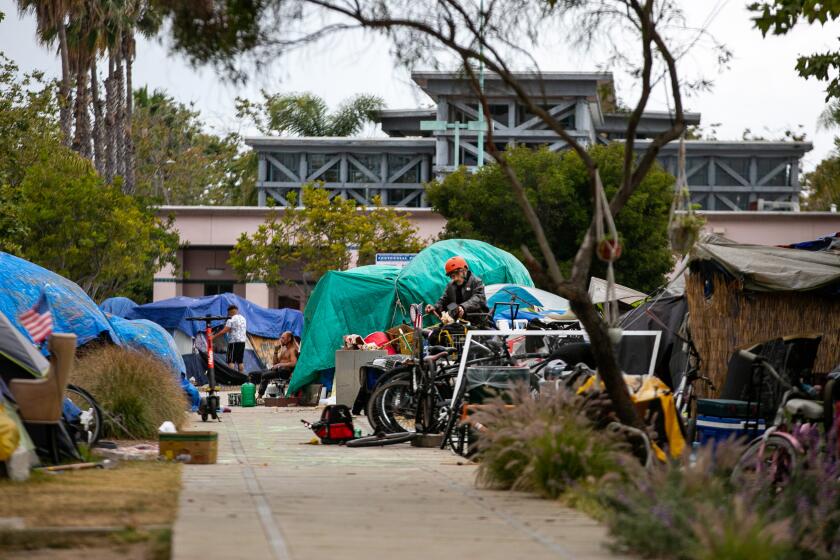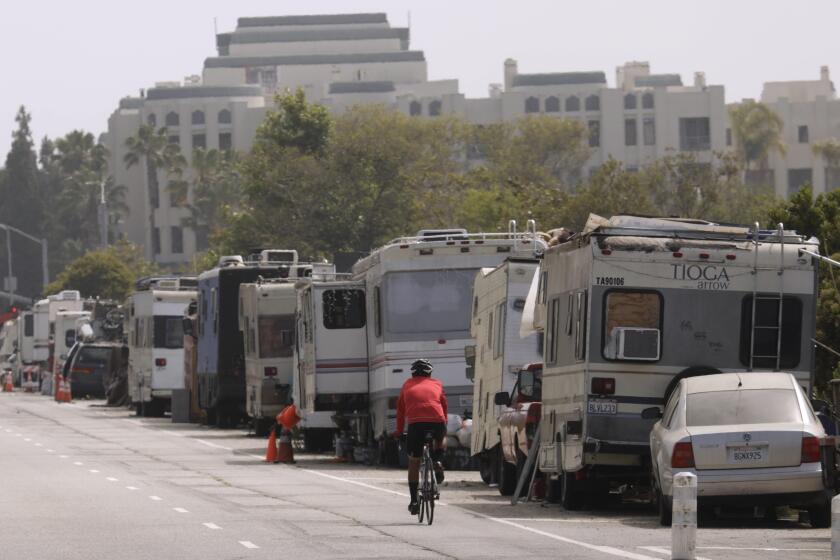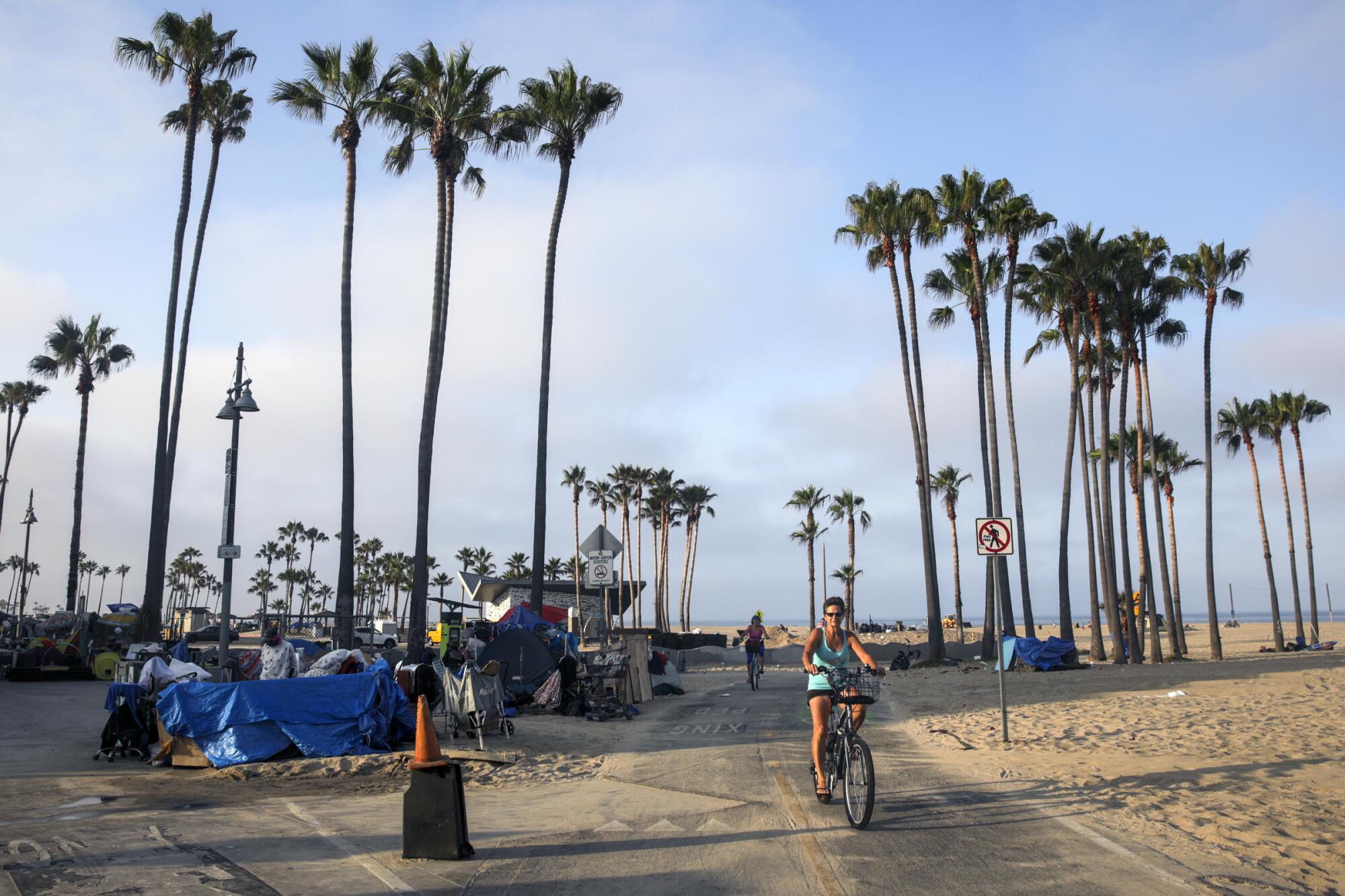
- Share via
Sometimes it doesn’t take much to tip a person’s life into disarray and homelessness. That humbling fact should shape how we think and feel about our unhoused neighbors. It should also shape how our new mayor, Karen Bass, handles the “state of emergency” facing Los Angeles. There’s a corollary fact that should give us hope: Sometimes it doesn’t take much to stabilize an unhoused person’s life and allow them to rebuild. Three unhoused women whom I met in my neighborhood, on the Westside of Los Angeles, were eager to discuss what landed them on the streets and how they hoped to move on. I spoke with Heidi in August, and Erica and Andromeda in November and December. They agreed to share their stories with The Times on the condition that their last names not be used. — Robert Karron
Andromeda
My name is Andromeda and I’m 25 years old. I’m originally from New York City, the Lower East Side. But most recently I lived in Norman, Okla., where my mother has family. I moved here in February with my (now ex-) boyfriend. We came out here to get sober. A lot of people from Oklahoma do that, actually. There are more programs here and better treatment facilities. In Oklahoma, it’s just a cycle of incarceration, back on the street, incarceration again. It worked, and we got sober, but then I relapsed after something bad happened. I’d rather not say — but it’s messed up. It was traumatic. It’s something no girl wants to go through. These days, I try to acquire people around me, so if a situation happens again I have people close.
Sometimes I think about going back to Oklahoma, because it’s been hard for me here. Although, in a way, I’m used to it; I’ve been homeless on and off since I was 11. My mother and I don’t get along; sometimes she’d kick me out of the house. Our relationship is better when we’re separated. Sometimes I’d stay with friends — couch surfing — but sometimes I was just on the street. The first time I stayed on the street [in New York], I was 16. I slept in Union Square Park.
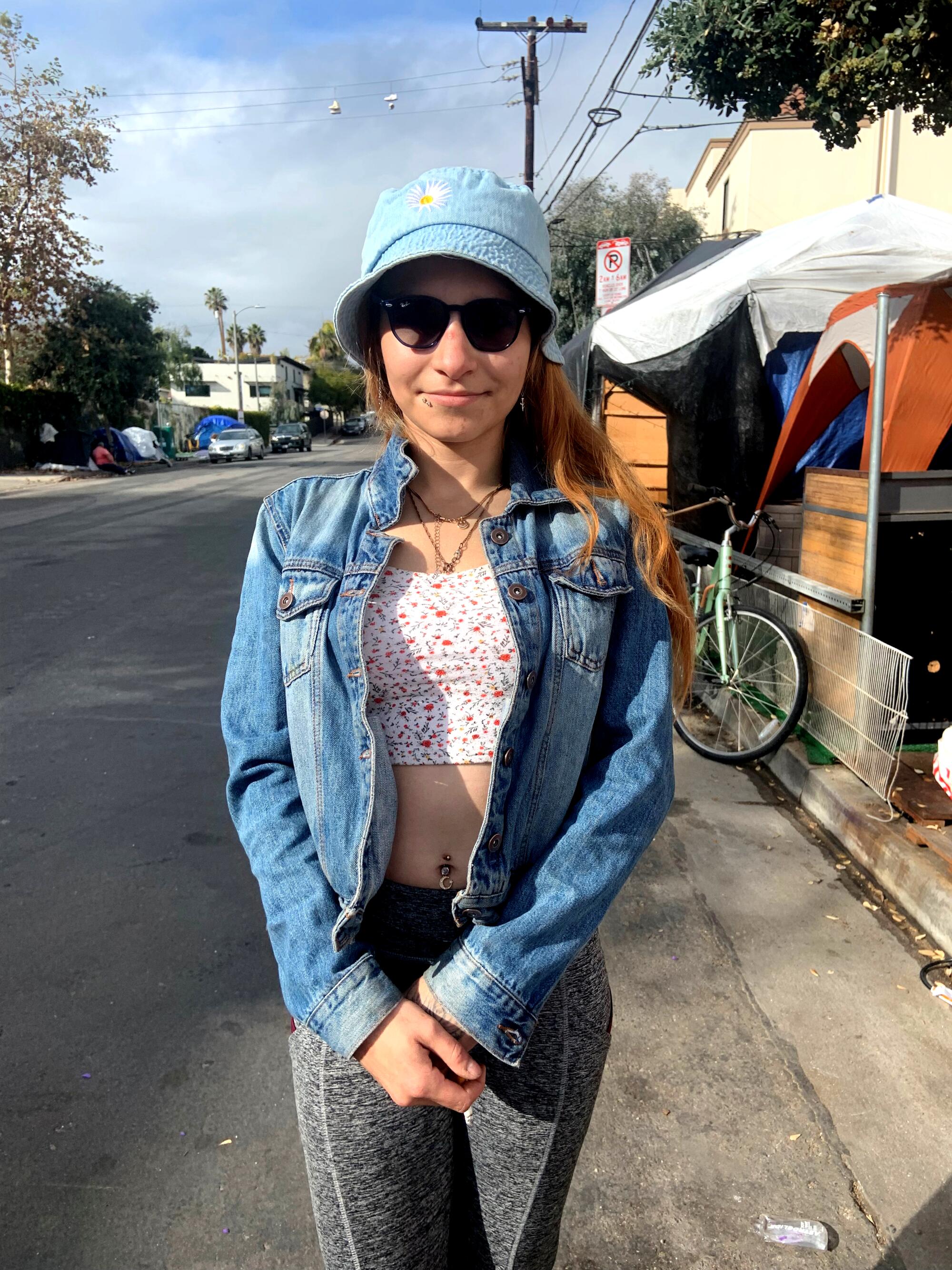
In New York, we lived near St. Mark’s Place. A cool area — but expensive, like it is here. And my mom was a single mom. (When I was a baby, my father was deported back to Venezuela; we’re in touch now, via Facebook.) My mother and I would move back and forth to Jersey City, which was a lot cheaper. Good schools there, too.
I did really well in school. I was put in an accelerated [AEP] program, and, even then, I got all A’s. I got one C, in the fifth grade, and I still remember it. It was based on a social studies project, which I completed, but the teacher didn’t let me present it. I worked really hard on that project; I still don’t know why he didn’t let me present it. My favorite subjects were math and science; I loved astronomy. But I also liked to prank the other kids. Even in kindergarten, I remember one day I tore the head off a doll and put it on the desk of my friend, who was sleeping. I banged on the desk and he woke up screaming! One time I pantsed my best friend in front of the class. At the next school I was kicked out for threatening to beat up a different friend—but I never actually threatened her; I’m not even the fighting type. I think I was just bored. I’d ace my tests, without studying, without even doing the homework. I was scheduled to graduate early — I had enough credits — but I skipped class so much, they held me back a year. By then we were in Oklahoma, which I didn’t like at all. I didn’t know anyone. I skipped school a lot.
Three men recount their family ties, their romances, how they came to live on the street and how they make ends meet.
I came to L.A. to get sober — but also to act and sing. I acted when I was younger. As a kid I tried out — and got two callbacks — for Nickelodeon and “The Lion King.” It’s always been my dream to act and sing in Hollywood. I haven’t been able to make any headshots here or anything. You know, I’m just trying to survive. I’ve been through a lot. As a 25-year-old, I’ve been through things other people haven’t. I have a strong mind. I think other people would break.
At first we were in La Jolla, at a recovery center. Then we moved to a sober-living facility in South Central. After we broke up, I moved in with a friend up the street, on Marine. We weren’t even in a relationship, but he got possessive and abusive (a few times, he tried to burn my stuff). I had to move out. I’ve applied to so many programs for housing, but no one answers my calls. I always get the runaround. Every resource is a dead end. I’ve been trying to get a housing subsidy and I can’t.
I shower every few days, in the marina. I know someone there with a boat. I’m about to go there now, actually; I take my bike. And I have MediCal; I get checkups periodically. I know how to take care of myself.
I’ve been through a lot. As a 25-year-old, I’ve been through things other people haven’t. I have a strong mind. I think other people would break.
— Andromeda
I’d like to go back to college. I want to take astrophysics classes, and I’d love to become an astronomer. I’ve been trying to go to college, but I need to find housing first. I’ve found it’s best to do one thing at a time. I have six or seven credits from Oklahoma City Community College, and I got my GED when I was incarcerated. (This was for a year, for grand larceny. I stole items from a Walmart — to help a friend’s family. It was all from the clearance rack, but somehow it qualified me for a felony.)
I was the valedictorian of my prison yard.
Three men, in their 50s, 60s and 70s, represent a growing population among L.A. County’s unhoused.
More people need to realize that if they had their money and resources taken away from them they’d be in the same spot. I don’t think people realize how close they are to being homeless. Just because you have money doesn’t mean it can’t be taken away. The other day I was at the park, and some mothers were saying their kids can’t play there because of the homeless people. That just disgusts me. We’re no different from anybody else.
Erica
My name is Erica and I’m 44 years old. I was born and raised in South Gate, where my dad had a job working for Northrop as an aviation mechanic. So, we were middle class — back when there was such a thing as middle class. I have one sister and three brothers; I’m the baby. I want to make it clear, nothing bad has ever happened to me. My parents got divorced, and my mom got remarried, but my stepdad was nice to me. I was active in high school, in student council and on the cheerleading squad — pom-poms, the whole bit. I also played softball; I was the catcher. You’ve got to be alert, and you’ve got to have big ol’ thighs.
After high school I went to a private vocational school in Louisiana (where my dad ended up moving, after the divorce), and I got my associate’s degree there, in information technology. You learn how to take a computer apart and put it back together again. I went into that field knowing it was high paying, and for a while things were great. I had a job in Lake Charles as a contract technician. I had an apartment, money. I was making $20 an hour. Then my mom got sick. I left my job to be with her. Sometimes things don’t work out the way you planned.
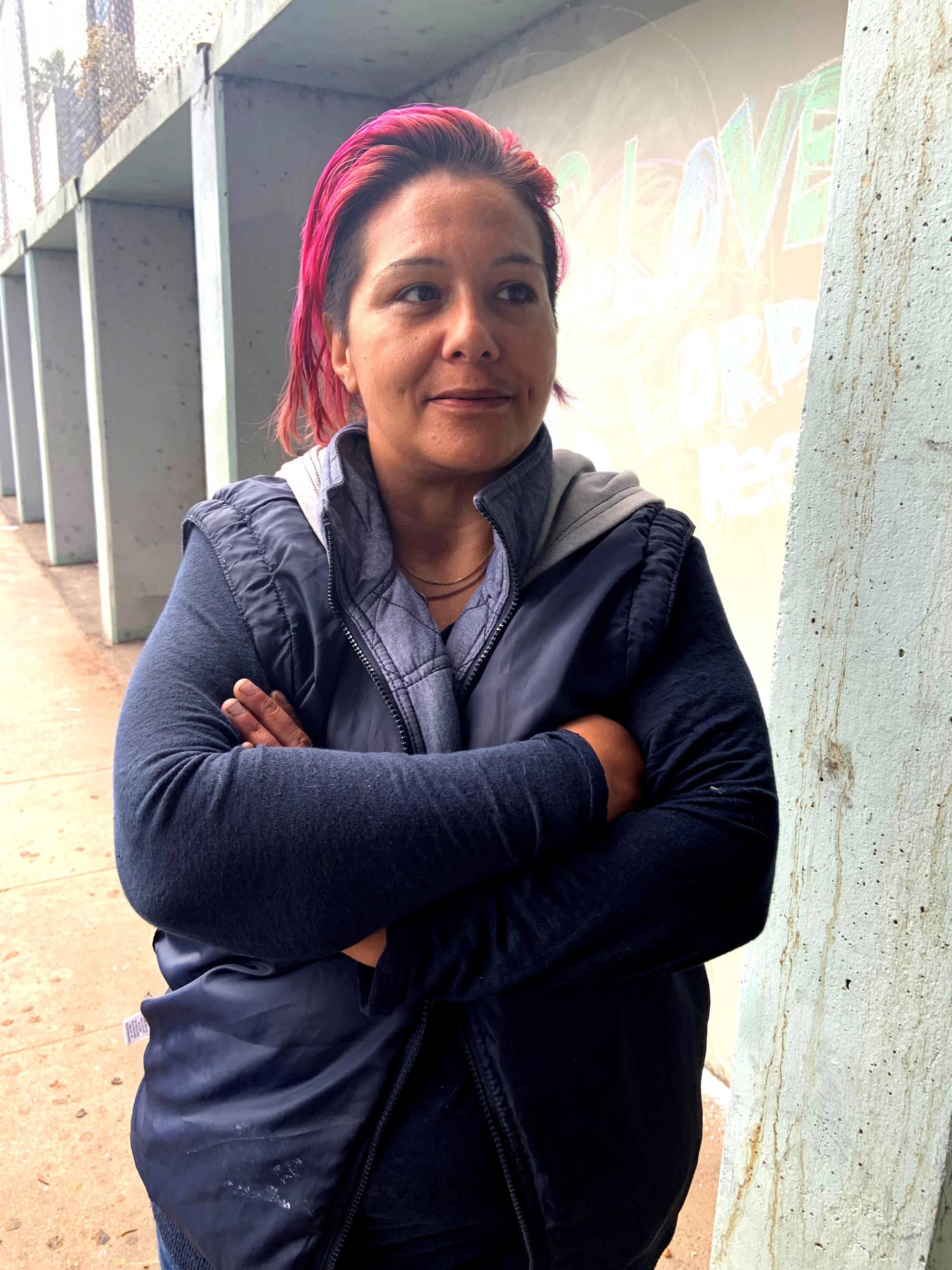
I was with her for four weeks. I was basically her hospice care. This was in Texas, where she’d moved after the divorce. After she died, we had to sell her house — in a buyer’s market. She owed back taxes, so each of us only got $4,500. After a month, I couldn’t go back to my job, and I’d been in an ugly relationship in Lake Charles that I also didn’t want to go back to. A friend offered me a bus ticket to L.A., and I took it.
I assumed I could stay with my sister, but when I called her from Phoenix she said no. She said: “You didn’t even call. You didn’t even write.” My two brothers were also in L.A., but they were struggling; I didn’t want to bother them. So I thought, “OK, I guess I’m going to undertake this new experience now of being homeless.” That was seven years ago.
A funny thing: Growing up in L.A. you see homeless people downtown, on skid row. When I’d see them I’d think, why don’t they go to the beach? They have showers there. It’s so much more comfortable. It doesn’t look as bad. I thought, if that ever happens to me I’m going to the beach. Way back when, as a kid, I thought this. I guess I always knew. So when it happened to me, that’s where I went. Here — to Venice.
Three unhoused women who live in Venice say they have learned to protect themselves, in body and spirit.
I have IT training, but companies won’t hire you if you don’t have an address. I haven’t worked in seven years. I live off food stamps. I’m starting to look for work now, though. Things are looking up for me. They’ve promised me housing in a complex nearby; I’m supposedly moving in tomorrow. It’s through St. Joseph’s Center and the Los Angeles Housing Authority. The lady from LAHSA is the one who told me I had the spot. I’ll be able to put my things somewhere, and I’ll be able to shower regularly. It’s huge. Tomorrow’s a big day for me. [Editor’s Note: Erica said this in late November, and when the author checked with her a few days later, she had moved in.]
I’ll move in with my partner, who’s in the tent now. We’ve been together for three years. It’s certainly easier to make it out here with a male partner who can help you and defend you and protect you from possible predators and other assorted weirdos. Before him, I was with another boyfriend — someone I just latched on to. The times when I haven’t had a boyfriend, I’ve had to have my wits about me. If you’re single, you can’t just be willy-nilly. You have to be really careful.
My dream job was actually to be a nurse. I still think about that. I know they have science and nursing classes nearby. Maybe I’ll go one of these days.
— Erica
What do I do all day? I wake up in the morning and I make my coffee, just like everybody else. Then I see what the day brings. You never know what you’ll find. One minute you’re on the street, and the next you’re in a loft on the beach, drinking a mimosa with some perfect stranger. (That actually happened.) I get around on my bike; everything’s local around here. And the tent keeps us both warm. You’re not exposed to the elements when you have a good tent, at least here in L.A. That’s why so many homeless people come out here, of course. In Colorado they don’t have this problem. You can’t live on the street in Colorado. It’s too cold. Someone gave us this tent. People are helpful; they’re nice to us. No one has harassed me in the last seven years.
In high school I liked science classes the most. I went into tech for the money, but my dream job was actually to be a nurse. I still think about that. I know they have science and nursing classes nearby. Maybe I’ll go one of these days. Maybe, after tomorrow, I’ll start to think about that.
Heidi
My name is Heidi and I’m 37 years old. I grew up in the Antelope Valley in a very conservative, Christian home. Personally, I’m not religious, but my parents took me to church, and they wouldn’t let me go to dances. I’ve kept their morals, but I’ve come to find that my idea of God is different. I have a different understanding of how He’s loving — not judgmental. (My parents adopted me when I was 2. I don’t know anything about my biological parents except that my mother was raped.)
In high school, my favorite subject was history. For one project, I interviewed a veteran who was in Normandy on D-Day. He said that, at the time, he didn’t think anything of it — but then he got the Purple Heart!
I played music in high school. I was in the marching band. My main instrument was the piano, but in marching band I played the flute. I took music lessons since I was 6. Growing up, I wanted to be a concert pianist. I practiced every morning. I’d wake up at 5:30 to practice. My favorite piece is “Hungarian Rhapsody.” It’s so bold — in your face! I think about playing piano all the time. It’s how I used to express myself.
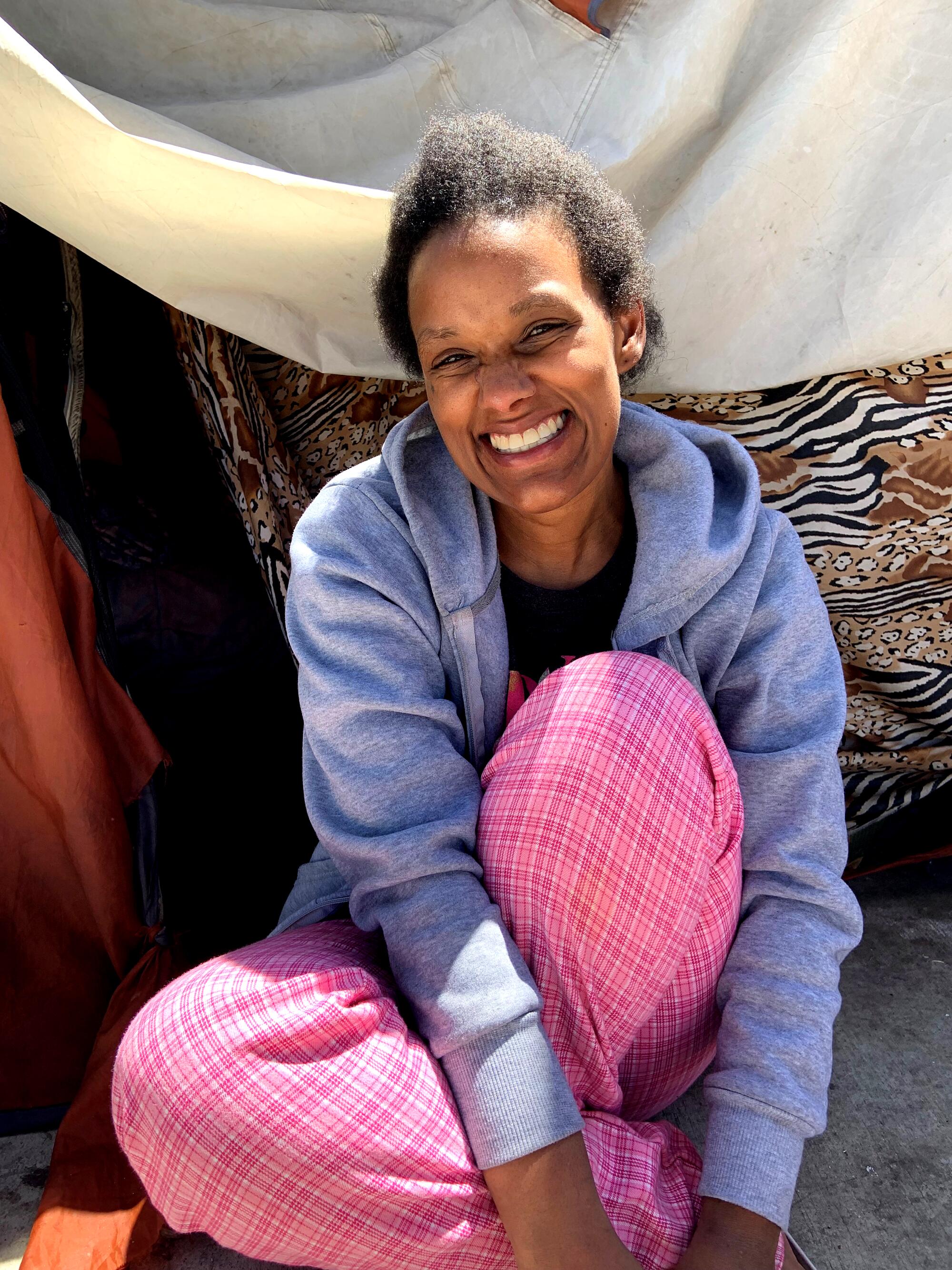
I’ve been on and off the streets since I was 19. It started when I went to college, at the Moody Bible Institute in Chicago. It was culture shock. It was so cold. I’d never been with boys before. I had no idea what was going on. I didn’t practice safe sex. I didn’t put two and two together. I got pregnant and had to drop out of school. My parents sent me to a maternity home. Originally, the plan was to give the baby up for adoption, but in the end I didn’t want to. I wanted to keep it. So they kicked me out of the maternity home. My parents wouldn’t take me in; I had nowhere to go. I was on the streets for a while — with my baby. This was in Venice. After two nights, a couple let us sleep on their couch. Eventually, my parents took the baby, but they wouldn’t take me — so I came back here. That’s when I got into drugs. Crystal. It was the first time. Before then, I’d never been on drugs.
Three men who have been staying in the tent city outside the Venice library branch talk about how they came to be there and how they see their futures.
Eventually my parents called the Department of Children and Family Services, and they put my baby up for adoption. So, after all that, he was adopted anyway. (I have five children; they’ve all been adopted. I was looking for love. I was trying to fill a void. I didn’t fight for custody for the middle three, but I did for the last one, another son. But at the last court date, they made the decision not to give him to me.)
Being an unhoused woman? It’s almost a nightmare sometimes. There are lots of predators. I’ve been assaulted several times. If I’m alone, guys will come up to me, and they’ll ask me a question — try to find a way into my tent. They’ll be invasive and not listen when I tell them to go away. Sometimes things escalate and we’re yelling at each other. Sometimes people will harass you. They’ll throw M-80s from their car. Or they’ll get us with paintballs. Sometimes they try to set our tents on fire.
My oldest child just turned 17, in July, so, next July, he’ll be 18, and — I’ve been thinking about this — he could find me.
— Heidi
I was in school before COVID. I was at L.A. Trade Tech, and I was working toward a degree to become a paralegal. I’m interested in the law. I’d like to be a voice for friends of mine who’ve been in and out of jail. And the arguments part, I like it. I like to debate. The program is two years long, and I was more than halfway there. I’d taken more than a year’s worth of courses. It was hard to keep up, let me tell you, but I kept up. I had to replace my schoolbooks all the time because when they’d come through here for cleanups they’d throw them away. Or sometimes people would just steal my books. But I just couldn’t keep up with school after COVID hit. It was all online. I’m in a tent, so no WiFi. The school actually gave me a computer, and I’d charge it, at Best Buy or at the Marshalls. Sometimes they’d even let me use their WiFi there. But eventually there was another cleanup. One of my bags was taken. My computer was in the bag.
Steve and Jeffrey talk about their late wives and how they hope to get back on their feet.
I’ve been thinking of going back to L.A. Trade Tech. I still have a couple of my books in the tent. Sometimes I think about going to law school, too, but that’s just so overwhelming. My oldest child just turned 17 in July, so next July he’ll be 18, and — I’ve been thinking about this — he could find me. I don’t know anything about him, but, I know that when he turns 18 he can look for me. So, basically, it’s crunch time for me now to get it together. I have until July.
Robert Karron teaches English at Santa Monica College.
More to Read
A cure for the common opinion
Get thought-provoking perspectives with our weekly newsletter.
You may occasionally receive promotional content from the Los Angeles Times.
